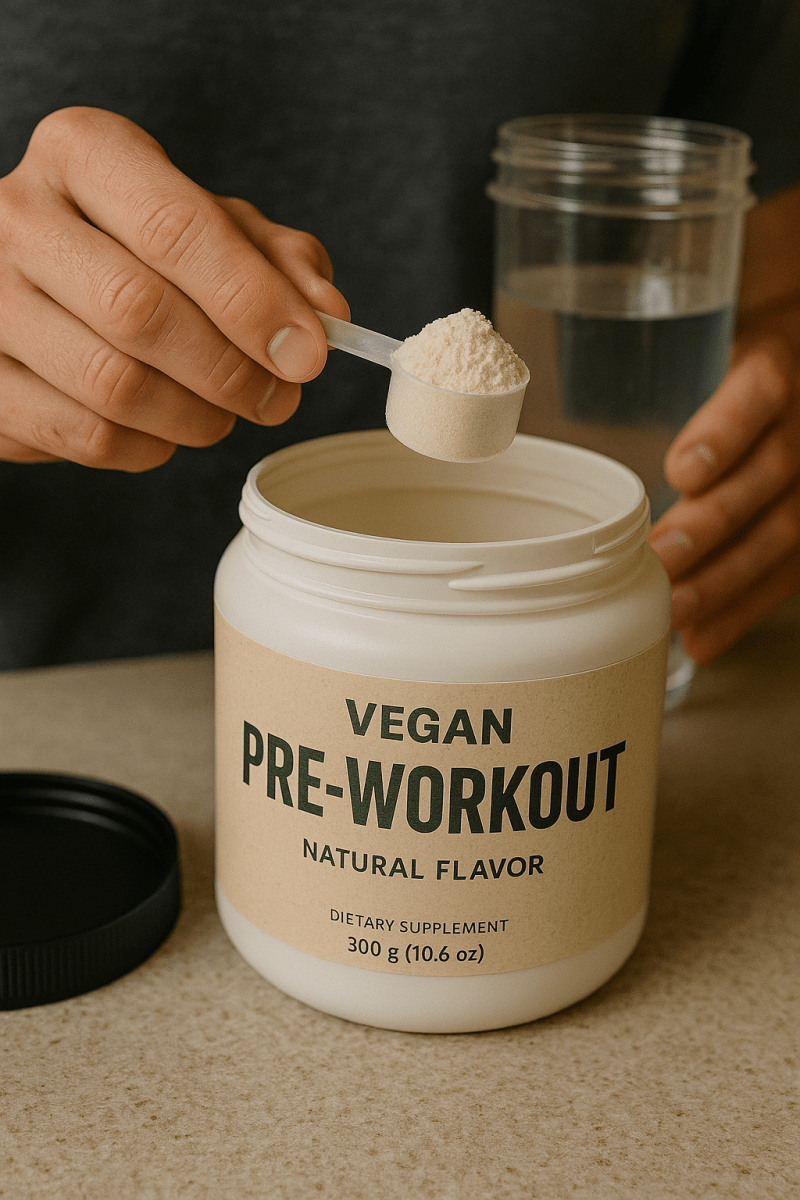![Pre Workout Meal For Muscle Gain [2025 Guide]](http://repworld.co.uk/cdn/shop/articles/pre-workout-meal-for-muscle-gain-2025-guide-5582916.jpg?v=1752639629&width=800)
Pre Workout Meal For Muscle Gain [2025 Guide]
If you're aiming for muscle gain, what you eat before your workout can make or break your progress. Many UK gym-goers overlook their pre workout meal, relying on quick fixes or training on an empty stomach. However, the right food before a session fuels your body, boosts performance, and supports muscle repair. Get it wrong and you risk hitting a wall, feeling lightheaded, or missing out on strength gains.
Pre workout meals aren’t about fad diets or unnecessary restriction. The focus is on providing your muscles with the right blend of nutrients, timed to give you the energy you need and promote muscle growth. Whether you’re strength training, chasing PRs, or working on endurance, your approach to eating beforehand has a noticeable impact.
Understanding how pre workout meals work—and learning how to get them right—can give you an edge in the gym, helping you train harder, recover faster, and see bigger results. Let’s break down the science and practical tips to build the best pre workout meal for muscle gain.
The Science Behind a Great Pre Workout Meal

Before you start lifting or smashing cardio, your body relies on blood sugar (glucose) and stored muscle glycogen as fuel. If you haven’t eaten well, these stores might not be topped up, making you feel tired, dizzy, or weak. An effective pre workout meal prevents muscle protein breakdown, supports recovery, and keeps you pushing hard for every rep.
According to the NHS Eatwell Guide, a balanced diet filled with both carbs and protein is essential for optimal performance. Protein is crucial for muscle repair and growth, while carbs fill up those energy reserves and delay fatigue. A pre workout meal can prime your body for a productive session and make sure you get the most out of your hard work.
Macronutrients: Carbs, Protein, and Fats
Nailing your macronutrients is the key to building the best pre workout meals. Here’s how each works:
- Carbohydrates: These are your main energy source. Complex carbs digest slowly, offering a steady release of energy during strength or cardio sessions.
- Protein: Essential for building and repairing muscle tissue, especially when paired with resistance training.
- Fats: Healthy fats provide longer-term energy, but too much just before a workout can slow digestion and make you sluggish.
The British Nutrition Foundation highlights the importance of timing and balance, suggesting meals 1–3 hours before training with a mix of carbs and protein for best results.
The Best Timing and Structure for Pre Workout Meals
The best pre workout meal isn't just about what you eat but when. Aim for a full meal 2–3 hours pre-training. If you need something closer to your workout, stick to smaller, easily digestible foods about 30–60 minutes before you hit the gym.
Eating too close to your session risks cramping or indigestion—wait too long and you might feel low on energy. Your ideal window depends on your body and preferences, but this structure will cover most bases:
- 2–3 hours before: Balanced meal with slow-release carbs and lean protein.
- 30–60 minutes before: Lighter snack with simple carbs and little fat.
Meal Size and Balance
Your size, training intensity, and goals play a role in how much to eat. For muscle gain, you can be generous with carbs and protein. Include a fist-sized portion of both in a main meal. For snacks, stick with half that amount and avoid heavy fats or fibre that might upset your stomach during movement.
Struggling to plan ahead? Check out these high protein meal prep strategies for easy inspiration tailored to strength and muscle gains.
Building Your Great Pre Workout Meals
The best pre workout meal is all about combining slow-release and fast carbs, lean protein, and small amounts of fat. Here are a few balanced ideas to fuel muscle growth and keep you energised through an intense gym session:
- A grain-based bowl with chicken or tofu, veggies, and a drizzle of olive oil
- Wholegrain toast with eggs or low-fat dairy, plus a piece of fruit
- Rice or pasta with beans and grilled vegetables
- Low-fat yoghurt with oats and berries for those who need fast, simple carbs
For more inspiration, explore healthy meal prep ideas that suit different tastes, especially if you’re short on time between work, studying, and gym sessions. If you’re looking to combine muscle gain and fat loss, there are plenty of meal prep ideas for weight loss that still include the right nutrients for performance.
Sample Pre Workout Meal Structures
Here’s a breakdown to help build your own great pre workout meals based on when you train:
- Morning sessions: Try a lighter meal, such as porridge with low-fat milk and banana or toast with nut butter. If you’re training within an hour of waking, stick with a quick digesting snack.
- Afternoon or evening workouts: A standard meal 2–3 hours beforehand, like lean meat or plant protein with brown rice and vegetables, preps your body for optimal training.
Want faster recovery and muscle gain? Stay consistent with your timing, eat a balanced blend of macros, and pay attention to how your body feels and performs in the gym.
Pre Workout Meal Myths

Social media and gym culture spin plenty of myths about pre workout meals. Let’s clear up some common ones:
- You need loads of protein just before training: While protein is important, a massive dose just before a workout isn’t magically effective. A steady intake spread through your day is better.
- High-fat foods give more energy: Fats digest slowly and might leave you feeling sluggish if you eat too much pre-workout. Stick to moderate portions.
- Training fasted burns more fat: Some believe skipping a pre workout meal leads to more fat loss. Evidence suggests this can limit performance and muscle gain, especially for people aiming to lift heavy or grow muscle.
- Pre workout supplements beat real food: Many supplements are marketed as fast fixes, but a meal with quality carbs and protein will always offer more in terms of nutrients and sustained energy.
For tailored advice, consider resources like the NHS health and fitness guidance which stress the importance of fueling workouts with balanced nutrition, not just supplements or extreme diets.
Expert Tips to Level Up Your Pre Workout Nutrition
Consistency drives results when it comes to pre workout meals. It’s not just about a one-off great meal, but building habits that last. Here are some strategies you can start using right away:
- Prep ahead: Batch cooking keeps you from relying on packet snacks or skipping meals. Set aside time at the start of your week.
- Listen to your body: Keep a food and training journal. Notice how different meals impact your energy, focus, and strength.
- Stay hydrated: Don’t forget to drink water throughout your day, not just before training. Dehydration leads to muscle cramps and slows recovery.
- Don’t skip carbs: Carbohydrates aren’t the enemy. For muscle gain, they’re your friend—powering bigger lifts and better endurance.
Remember, variety stops meals getting stale. Cycle through a range of foods to keep your nutrition balanced and your palate interested.
Want to stay motivated to eat well for muscle gain? Read more on the REP blog for up-to-date nutrition tips and nutrition strategies that fit your lifestyle.
Mastering your pre workout meal is about more than ticking a box—it’s about empowering every gym session. When you combine balanced carbohydrates, quality protein, smart timing, and a bit of prep, you’ll notice the difference in your energy, focus, and muscle gains.
Whether you’re training in the morning before work or heading to the gym after a long day, having a solid pre workout meal routine sets the stage for growth and consistency. Use advice from trusted UK sources, experiment with meal prep, and keep an eye on how your body responds to different foods and timings.
Pre Workout Meal Muscle Gain FAQ's
1: Why is a pre workout meal important for muscle gain?
A pre workout meal provides the energy and nutrients your body needs to train hard and recover effectively. Without the right fuel, you risk early fatigue, reduced strength, and even muscle breakdown. Eating a mix of complex carbs and lean protein before training boosts performance, delays fatigue, and sets your body up for better muscle repair and growth afterward.
2: How long before training should I eat my pre workout meal?
Aim for a balanced meal 2–3 hours before your workout if possible. This gives your body time to digest and absorb the nutrients. If you’re short on time, a lighter snack 30–60 minutes before your session can still be beneficial—just stick to easily digestible carbs and a bit of protein, and avoid too much fat or fibre which can cause discomfort during training.
3: What are the best foods to eat before a workout to build muscle?
Ideal pre workout foods combine carbohydrates (for energy) and protein (for muscle repair). Examples include:
-
Wholegrain toast with eggs or low-fat cheese
-
Chicken, rice, and steamed vegetables
-
Porridge with milk and banana (great for morning sessions)
-
Low-fat yoghurt with berries and oats
Avoid large amounts of high-fat or high-fibre foods just before training, as they can slow digestion and leave you feeling sluggish.
4: Do I need to eat before early morning workouts?
Yes—especially if your goal is muscle gain. If you’re training soon after waking up, a small, quick-digesting snack can help, such as a banana, protein shake, or a slice of toast with nut butter. Skipping food may lead to low energy, reduced strength, and less effective workouts. Even something small can make a noticeable difference.
5: Can I rely on supplements instead of a pre workout meal?
While pre workout supplements can support performance, they shouldn’t replace real food. Whole foods provide a broader range of nutrients and more sustained energy. For muscle gain, focus on consistent meals with protein and carbs—supplements can be an add-on, but not the foundation of your nutrition strategy.


